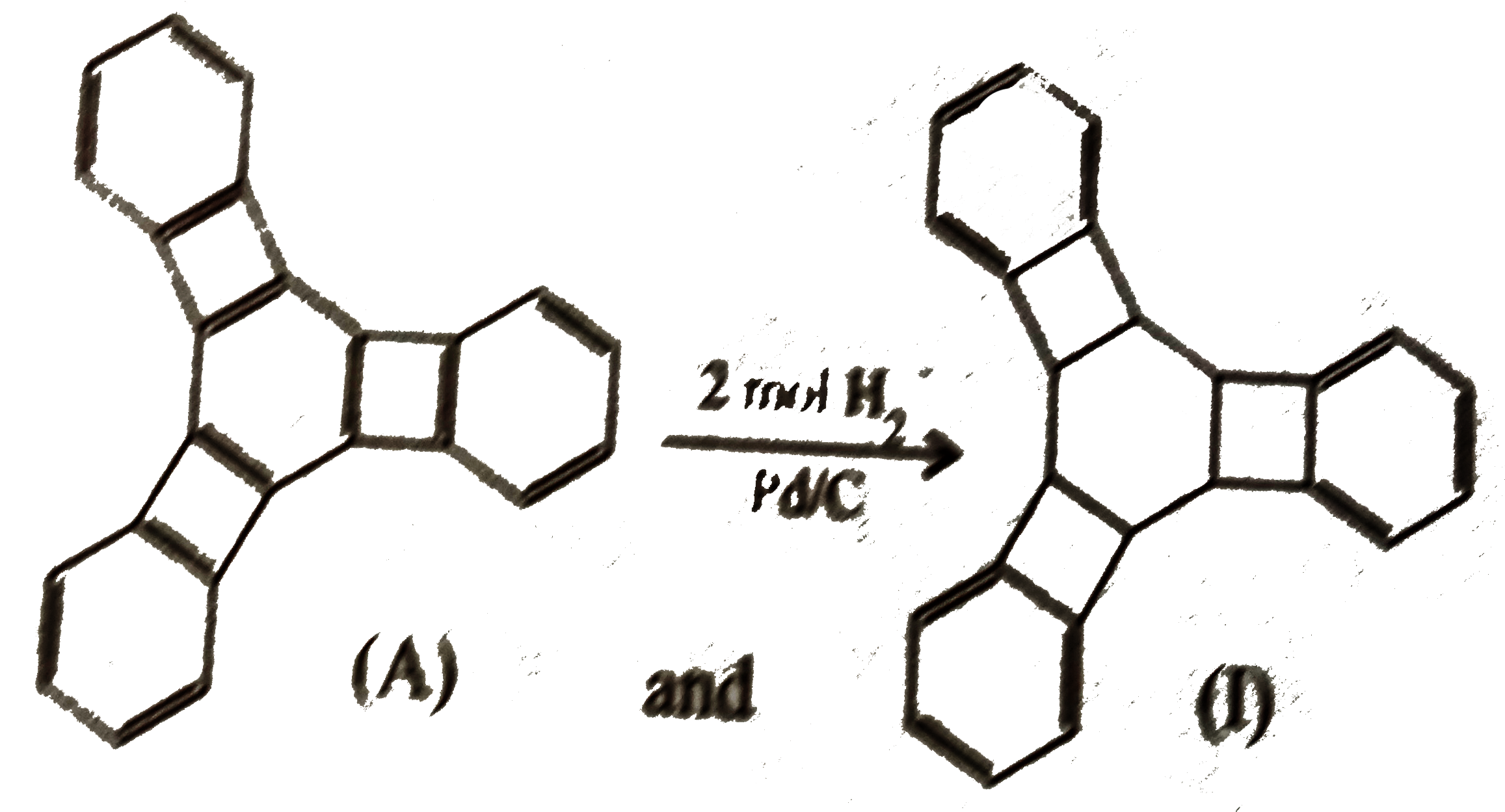Statement-1 : Thermochemistry involves the calculation of heat change through balanced reactions.
And
Statement-2 : Enthalpy is a state function.
Statement-1 is True, Statement-2 is True, Statement-2 is a correct explanation for Statement-1
Statement-1 is True, Statement-2 is True, Statement-2 is Not a correct explanation for Statement-1
Statement-1 is True, Statement-2 is False
Statement-1 is False, Statement-2 is True
The correct Answer is:B
To analyze the statements provided in the question, we will evaluate each statement separately and determine their validity.
Step 1: Evaluate Statement-1
Statement-1: Thermochemistry involves the calculation of heat change through balanced reactions.
Analysis:
Thermochemistry is indeed a branch of thermodynamics that focuses on the heat changes associated with chemical reactions. It involves studying how energy is absorbed or released during chemical reactions, which can be quantified through the enthalpy change (ΔH) of the reactions. The calculations are typically based on balanced chemical equations, as they provide the stoichiometric relationships necessary to determine the heat changes involved.
Conclusion: Statement-1 is True.
Step 2: Evaluate Statement-2
Statement-2: Enthalpy is a state function.
Analysis:
Enthalpy (H) is defined as a thermodynamic potential that measures the total heat content of a system. It is indeed a state function, which means that its value depends only on the current state of the system (defined by variables such as temperature, pressure, and composition) and not on the path taken to reach that state. In other words, the change in enthalpy (ΔH) for a process depends only on the initial and final states of the system, not on how the process occurred.
Conclusion: Statement-2 is True.
Final Conclusion
Both statements are true:
- Statement-1 is true because thermochemistry does involve the calculation of heat changes through balanced reactions.
- Statement-2 is true because enthalpy is indeed a state function.
Statement-1: Thermochemistry involves the calculation of heat change through balanced reactions.
Thermochemistry is indeed a branch of thermodynamics that focuses on the heat changes associated with chemical reactions. It involves studying how energy is absorbed or released during chemical reactions, which can be quantified through the enthalpy change (ΔH) of the reactions. The calculations are typically based on balanced chemical equations, as they provide the stoichiometric relationships necessary to determine the heat changes involved.
Statement-2: Enthalpy is a state function.
Enthalpy (H) is defined as a thermodynamic potential that measures the total heat content of a system. It is indeed a state function, which means that its value depends only on the current state of the system (defined by variables such as temperature, pressure, and composition) and not on the path taken to reach that state. In other words, the change in enthalpy (ΔH) for a process depends only on the initial and final states of the system, not on how the process occurred.
Both statements are true:
- Statement-1 is true because thermochemistry does involve the calculation of heat changes through balanced reactions.
- Statement-2 is true because enthalpy is indeed a state function.
Topper's Solved these Questions
- THERMODYNAMICSBOOK - AAKASH INSTITUTE ENGLISHCHAPTER - THERMODYNAMICSEXERCISE - SECTION-F
3 Videos
- THERMODYNAMICSBOOK - AAKASH INSTITUTE ENGLISHCHAPTER - THERMODYNAMICSEXERCISE - SECTION-G
5 Videos
- THERMODYNAMICSBOOK - AAKASH INSTITUTE ENGLISHCHAPTER - THERMODYNAMICSEXERCISE - SECTION-D
9 Videos
- THE SOLID STATE BOOK - AAKASH INSTITUTE ENGLISHCHAPTER - THE SOLID STATE EXERCISE - Assignment (SECTION - D) (ASSERTION-REASON TYPE QUESTION)
20 Videos
Similar Questions
Statement-1 : The third law of thermodynamics implies that absolute zero cannot be reached.
Statement-2 : ΔG∘ for an ideal gas reaction is a function of temperature.
Statement-3 : The adiabatic expansion of a gas into a vacuum is spontaneous.
View SolutionStatement -I : There is no change in enthalpy of an ideal gas during compression at constant temperature.
Statement-II: Enthalpy of an ideal gas is a function of temperature and pressure.
View Solution
Knowledge Check
Assertion : The heat of a reaction does not depend upon the temperature at which reaction is carried out.
Reason : Temperature is a state function.AIf both Assertion and Reason are CORRECT and Reason is the CORRECT explanation of the Assertion.BIf both Assertion and Reason are CORRECT but Reason is not the CORRECT explanation of the Assertion.CIf Assertion is CORRECT but Reason is INCORRECT.DIf Assertion is INCORRECT but Reason is CORRECT.
Statement-1 : Neutralisation reaction is an Endothermic Process.
Statement-2 : Standard Enthalpy of Neutralisation for different pairs of strong acid and strong base are different.
Statement-3 : Standard Enthalpy of Neutralisation for a pair of strong acid and strong base is higher than that of weak acid and weak base.
View SolutionStatement -1: The Standard free energy changes of all spontaneously occurring reactions are negative .
Statement-2: The standard free energies of the elements in their standard states at 1 bar and 2985K aare taken aszero.
View Solutiona. Statement- 1 and Statement- 2 are true, and state-ment- 2 is the correct explanation of Statement- 1.
b. Statement- 1 and Statement- 2 are true but Statement- 2 is not the correct explanation of Statement- 1.
c. Statement- 1 is true and Statement- 2 is false.
d. Statement- 1 is false and Statement- 2 is true.
e. Statement- 1 is false and Statement- 2 is false.
Statement- 1:
Compound (I) is formed not (II).
 and
and 
Statement- 2:
Due to the reduction of central ring, 3 four-membered anti-aromatic rings become stable to from (I). In (II), due to the reduction of terminal ring, only one anti-aromatic ring can be stabilised.
View SolutionStatement-1: The internal energy of a system does not change when there is not change in temperature
Statement-2: The internal energy of a gaseous system is state function.
View SolutionEach question has four choices, a,b,c and d,out of which only one is correct. Each question contains STATEMENT 1 and STATEMENT 2. if both the statements are true and statement 2 is the correct explanation of statement 1. If both the statements are true but statement 2 is not the correct explanation of statement 1. If statement is True and statement2 is false. If statement1 is false and statement2 is true. Statement 1: f(x)=(log)ex cannot be expressed as the sum of odd and even function. Statement 2 : f(x)=(log)ex in neither odd nor even function.
View SolutionStatement -1 : Rate of SN1 reaction is faster than that of SN2 reaction
Statement -2 : SN2 reaction is favoured by polar aprotic solvent
Statement -3 : SN1 reaction involves racemization
View SolutionEach question has four choices, a,b,c and d,out of which only one is correct. Each question contains STATEMENT 1 and STATEMENT 2. if both the statements are true and statement 2 is the correct explanation of statement 1. If both the statements are true but statement 2 is not the correct explanation of statement 1. If statement is True and statement2 is false. If statement1 is false and statement2 is true. Consider the function f(x)=sin(kx)+{x}, where (x) represents the fractional part function. Statement 1 : f(x) is periodic for k=mπ, where m is a rational number Statement 2 : The sum of two periodic functions is always periodic.
View Solution
